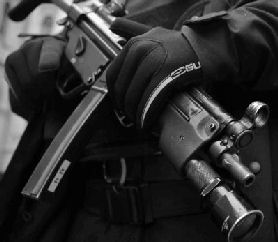MI6 chief speaks out on terror threat and torture
The head of MI6, Sir John Sawers, denies that his agents engage in torture. Foreign Affairs Correspondent Jonathan Rugman says the historic speech is an attempt to combat negative media coverage.
The chief of the Secret Intelligence Service, MI6, today issued a warning that its secrets must not be compromised if it is to continue protecting the country.
In the first public speech by a serving MI6 chief Sir John Sawers praised the work of the intelligence agency saying that every day he received reports of terrorists “bent on maiming and murdering” people in Britain.
Sir John said if MI6 was to succeed in countering the threat it was essential its agents could be sure their secrets are protected.
“Secrecy is not a dirty word. Secrecy is not there as a cover up. Secrecy pays a crucial part in keeping Britain safe and secure,” he said in a speech to the Society of Editors in London.
Our people can’t and don’t talk about what they do. You don’t know them, but I do. It’s an honour to lead them. Sir John Sawers
Torture and human rights
Sir John said that he was confident that MI6 officers operated with the “utmost integrity” and would have “nothing whatsoever” to do with torture.
Yet he said that the service also had to operate in the real world, and needed to work with agencies from other countries which were not always “friendly democracies”.
“If we know or believe action by us will lead to torture taking place, we’re required by UK and international law to avoid that action,” he said.
“And we do, even though that allows the terrorist activity to go ahead.
“Some may question this, but we are clear that it’s the right thing to do. It makes us strive all the harder to find different ways, consistent with human rights get the outcome that we want.”
Cyber threat
He went on: “Suppose we received credible intelligence that might save lives, here or abroad. We have a professional and moral duty to act on it. We will normally want to share it with those who can save those lives,” he said.
“We also have a duty to do what we can to ensure that a partner service will respect human rights. That is not always straightforward.
“Yet if we hold back, and don’t pass that intelligence, out of concern that a suspect terrorist may be badly treated, innocent lives may be lost that we could have saved.
“These are not abstract questions just for philosophy courses or searching editorials, they are real, constant operational dilemmas. Sometimes there is no clear way forward. The more finely-balanced judgments have to be made by ministers themselves.”
The spy boss said the threat to Britain from cyber -warfare was a “big task for the future”.
Speaking after the government names cyber-terrorism as a major UK security threat, Sir John said: “Electricity grids, our banking system, anything can be vulnerable.”
Intelligence-sharing
In particular he stressed the importance of intelligence-sharing with the United States, and expressed concern that the “control principle” – which means that a service which obtains the intelligence controls how it is used – should not be undermined.
“It’s rule number one of intelligence sharing. We insist it with our partners and they insist on it with us. Because whenever intelligence is revealed, others try to hunt down the source.

“Agents can identified, arrested, tortured and killed by the very organisations who are working against us.
“So if the control principle is not respected, the intelligence-sharing dries up. That’s why we have been so concerned about the possible release of intelligence material in recent court cases.”
Detainees
Sir John said he welcomed the recent Gibson Inquiry, announced by Prime Minister David Cameron, into the treatment of the detainees held abroad. He stressed that MI6’s methods must remain secret.
“If our operations and methods become public, they won’t work. Agents take risks. They will not work with SIS, will not pass us the secrets they hold, unless they can trust us not to expose them,” he said.
“Foreign partners need to have certainty that what they tell us will remain secret – not just most of the time but always.
“Without the trust of agents, the anonymity of our staff, the confidence of partners, we would not get the intelligence. The lives of everyone living here would be less safe.
“The United Kingdom would be more vulnerable to the unexpected, the vicious and the extreme.”
No terror arrests from stop and search
Official Home Office figures released today showed that no-one stopped and searched by police under anti-terror powers was arrested for a terrorism-related offence.
The figures showed:
A total of 101,248 stops and searches were made under section 44 of the Terrorism Act 2000 in 2009/10, but only one in every 200 led to an arrest and none of these were terror-related.
Across Great Britain, 506 arrests were made after people were stopped and searched under section 44 of the Terrorism Act, 0.5 per cent of the 101,248 stops and searches, compared with 10 per cent of stops carried out using non-terror powers.
The use of the stop and search powers fell by 60 per cent compared with 2008/09.
Of all the stops and searches, four out of five of these were made in the Metropolitan Police area, with almost a fifth being made by British Transport Police.
Overall, 59 per cent described themselves as white, 17 per cent as Asian or Asian British, 10 per cent as black or black British and 2 per cent as of mixed ethnicity.
-
Latest news




